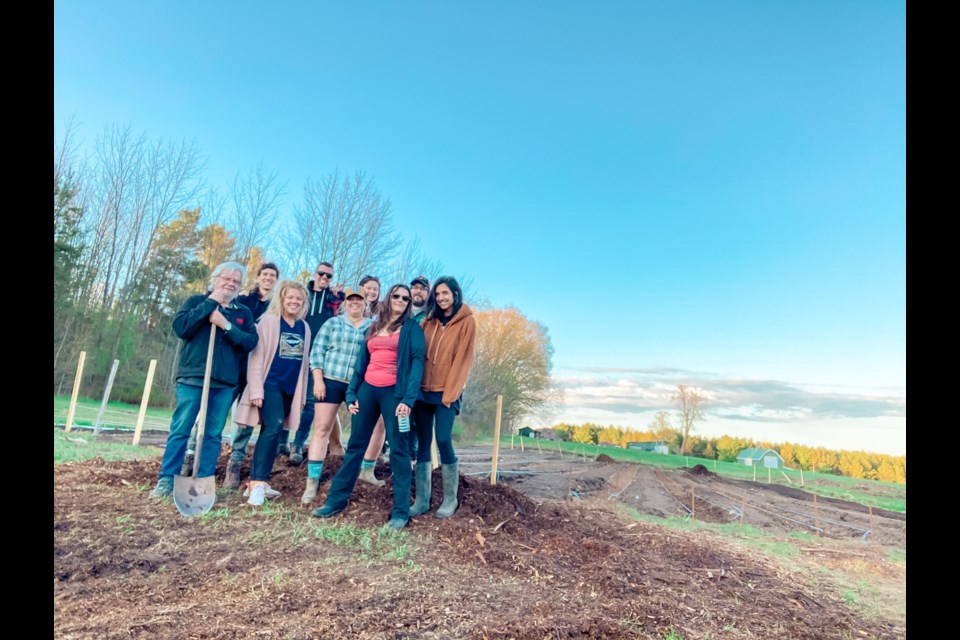If the true measure of practising your passion is in humility then Kristyn Tinney’s fervour for growing food at Folklore Farm is the epitome of humble pie.
When asked what her title is at Folklore Farm, she struggles to find the right words.
“We’re growers,” says Tinney, settling on a title after cycling through a long list of monikers that don’t quite fit her role at Folklore Farm. “I don’t want to say we’re farmers, because there’s so much more.”
Tinney and her husband started a community shared agriculture food box program last year, and the success is still as fresh as the food they grow on their farm.
As a certified permaculture designer, Tinney calls Folklore Farm in Penetanguishene an experimental, regenerative permaculture practice in motion.
“We say we started a CSA (community shared agriculture) with a lot of humility,” says Tinney about the 14 families that invested in food boxes last year.
“It went better than we had hoped for. We were expecting a lot of learning curves. We were not expecting to be as successful as we were.”
The land they work on is no till, and their plan is to eventually have a closed-loop, or zero-waste farming system.
This means every scrap of food will go to feed the chickens, goats, and other animals. The compost created will feed the soil in the garden, and the manure produced will regenerate the soil helping the land continuously become healthier.
Zero-waste farming is a return to traditional farming practices that use and recycle everything produced.
Their food boxes offer approximately $25 worth of produce weekly throughout the growing season. The boxes include leafy greens, heirloom tomatoes, and herbs like tulsi that are adaptogenic — substances known to enhance the body’s ability to deal with stress.
Tulsi is an herb used in ayurvedic health practices that is dubbed the “Mother Medicine of Nature.” Various studies show that tulsi has antimicrobial, anti-oxidant, and anti-inflammatory properties — to name only a few of the benefits of this “Queen of Herbs,”
While there could be more to add to the list, since the food box program is new, and they are still experimenting, Tinney doesn’t want to promise certain vegetables in case there are crop failures. Last year, they planted squash, but the crop never made it to harvest.
The surprise of the box is one of the things that makes investing in a CSA for vegetables so exciting. It challenges you to cook with new ingredients almost every week.
After the pandemic hit, and many weeks without work, the challenge for Tinney was in becoming the groundskeeper at the Tinney Family’s 83-acre spread.
While managing 40 acres of land — about half the family’s property is forested — the family was looking for ways to make the land more sustainable.
“Then came in the sheep,” says Tinney, “to cut the grass.”
Considering the Tinney family is known locally for producing fine triple mix and top soil, it seemed like a natural next step to use the land and the soil to become more food stable.
Putting her 15 years of studying permaculture into practice, Tinney and her husband started experimenting with heirloom varieties, and garden vegetables to get the land producing.
The farm, which Tinney calls a market garden, was built around syntropic farming practices that improve soil while reducing water and nutrient intake. That includes composting, companion planting, biodynamic farming practices, rainwater capture, and mushroom farming to help trees extract nutrients from the soil.
“We’re going to be making our own everything,” says Tinney, becoming animated while talking about the future of the farm, and the hot sauce they make in-house.
This year, they plan to offer fresh cut flowers as they remediate more of the land in an effort to have the soil deemed organic — a process that takes years.
“We like to think of it as our cosmic fairytale farm,” says Tinney while explaining how she and her family came up with the name Folklore.
“The kids loved it. It’s about storytelling. About our grandmothers. About traditional farming practices.”
The idea of the farm is to work through a holistic framework.
“Everything we’re doing is a journey,” says Tinney. “We don’t have an end goal other than learning, and we’re learning as we go.”
To learn more about Folklore Farm, and invest in a food box, visit their website before the upcoming growing season. The farm is located on Fuller Avenue in Penetanguishene, and they welcome visits from the public to enjoy the animals, including Boone, the family’s new llama.
